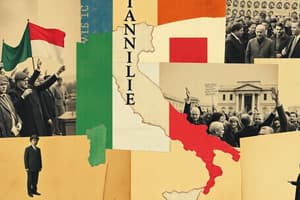Podcast
Questions and Answers
Which of the following unification movements resulted in the formation of a kingdom?
Which of the following unification movements resulted in the formation of a kingdom?
- Italian Unification (correct)
- Irish War of Independence
- Greek War of Independence
- German Unification
Which fascist ideology emphasized racial purity and anti-Semitism?
Which fascist ideology emphasized racial purity and anti-Semitism?
- French Nationalism
- Spanish Falangism
- Italian Fascism
- German Nazism (correct)
What was a common factor influencing the development of national identity?
What was a common factor influencing the development of national identity?
- Economic crisis
- Communist ideology
- Foreign rule
- Language and literature (correct)
Which of the following ethnic conflicts led to the partition of a country?
Which of the following ethnic conflicts led to the partition of a country?
Who was the leader of the German Unification movement?
Who was the leader of the German Unification movement?
What was a characteristic of fascist ideologies?
What was a characteristic of fascist ideologies?
Which national identity was shaped by the concept of the Volk?
Which national identity was shaped by the concept of the Volk?
Which unification movement was led by Giuseppe Garibaldi?
Which unification movement was led by Giuseppe Garibaldi?
What was a result of the Yugoslav Wars?
What was a result of the Yugoslav Wars?
Which fascist ideology emphasized Spanish nationalism and authoritarianism?
Which fascist ideology emphasized Spanish nationalism and authoritarianism?
Study Notes
Unification Movements
- Emerged in 19th century Europe as a response to fragmentation and foreign rule
- Aimed to unite people sharing common language, culture, and history
- Key examples:
- Italian Unification (1815-1871): led by Giuseppe Garibaldi and Victor Emmanuel II, resulted in the formation of the Kingdom of Italy
- German Unification (1815-1871): led by Otto von Bismarck, resulted in the formation of the German Empire
- Greek War of Independence (1821-1832): led to the recognition of Greece as an independent state
Ethnic Conflicts
- Arisen from nationalist sentiments and competing claims to territory and resources
- Examples:
- Balkan Wars (1912-1913): series of conflicts between Balkan states and the Ottoman Empire, led to the formation of Albania and redrawing of borders
- Irish War of Independence (1919-1921): led to the partition of Ireland and the establishment of the Irish Free State
- Yugoslav Wars (1991-2001): series of conflicts following the dissolution of Yugoslavia, resulting in the formation of several independent states
Fascist Ideologies
- Emerged in the early 20th century as a response to economic crisis, political instability, and fear of communism
- Characterized by:
- Authoritarianism and totalitarianism
- Nationalism and militarism
- Anti-communism and anti-liberalism
- Cult of personality and charismatic leadership
- Key examples:
- Italian Fascism (1922-1943): led by Benito Mussolini, emphasized Italian nationalism and imperialism
- German Nazism (1933-1945): led by Adolf Hitler, emphasized racial purity, anti-Semitism, and territorial expansion
- Spanish Falangism (1936-1975): led by Francisco Franco, emphasized Spanish nationalism and authoritarianism
National Identity
- Refers to the shared sense of belonging, culture, and history among a group of people
- Influenced by:
- Language and literature
- History and mythology
- Customs and traditions
- Politics and government
- Examples:
- French national identity: shaped by the Enlightenment, Revolution, and colonial empire
- British national identity: shaped by the monarchy, Imperial legacy, and cultural heritage
- German national identity: shaped by the concept of the Volk, Romanticism, and the legacy of World War II
Unification Movements
- 19th century Europe witnessed unification movements in response to fragmentation and foreign rule
- Aim was to unite people sharing common language, culture, and history
- Italian Unification (1815-1871):
- Led by Giuseppe Garibaldi and Victor Emmanuel II
- Resulted in the formation of the Kingdom of Italy
- German Unification (1815-1871):
- Led by Otto von Bismarck
- Resulted in the formation of the German Empire
- Greek War of Independence (1821-1832):
- Led to the recognition of Greece as an independent state
Ethnic Conflicts
- Emerged from nationalist sentiments and competing claims to territory and resources
- Balkan Wars (1912-1913):
- Series of conflicts between Balkan states and the Ottoman Empire
- Led to the formation of Albania and redrawing of borders
- Irish War of Independence (1919-1921):
- Led to the partition of Ireland
- Established the Irish Free State
- Yugoslav Wars (1991-2001):
- Series of conflicts following the dissolution of Yugoslavia
- Resulted in the formation of several independent states
Fascist Ideologies
- Emerged in the early 20th century due to economic crisis, political instability, and fear of communism
- Characterized by:
- Authoritarianism and totalitarianism
- Nationalism and militarism
- Anti-communism and anti-liberalism
- Cult of personality and charismatic leadership
- Italian Fascism (1922-1943):
- Led by Benito Mussolini
- Emphasized Italian nationalism and imperialism
- German Nazism (1933-1945):
- Led by Adolf Hitler
- Emphasized racial purity, anti-Semitism, and territorial expansion
- Spanish Falangism (1936-1975):
- Led by Francisco Franco
- Emphasized Spanish nationalism and authoritarianism
National Identity
- Refers to the shared sense of belonging, culture, and history among a group of people
- Influenced by:
- Language and literature
- History and mythology
- Customs and traditions
- Politics and government
- French national identity:
- Shaped by the Enlightenment, Revolution, and colonial empire
- British national identity:
- Shaped by the monarchy, Imperial legacy, and cultural heritage
- German national identity:
- Shaped by the concept of the Volk, Romanticism, and the legacy of World War II
Studying That Suits You
Use AI to generate personalized quizzes and flashcards to suit your learning preferences.
Description
Learn about the unification movements that emerged in 19th century Europe, including Italian Unification, German Unification, and Greek War of Independence. Discover how they aimed to unite people sharing common language, culture, and history.




